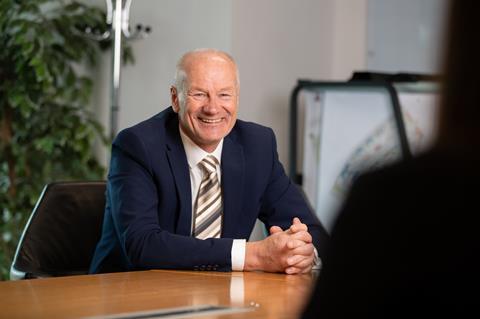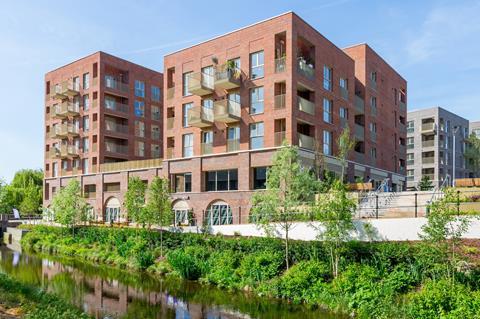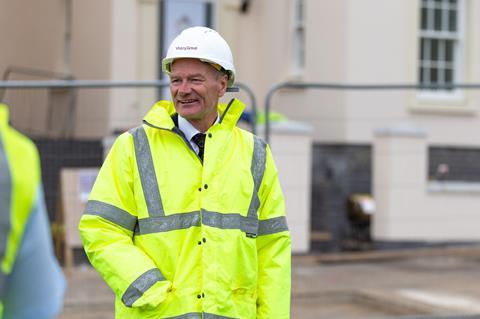In an exclusive interview, the Vistry chief executive talks with Joey Gardiner about bonuses, subcontractor price cuts, offsite construction - and whether Vistry can really follow through on its industry leading expansion strategy

It’s a little bit under eight years since Greg Fitzgerald stepped down from running Galliford Try without a role to go to, and the larger-than-life Vistry chief executive is offering me retirement tips.
The problem is, the self-confessed “maniac” workaholic has just taken on an additional role at £4bn-turnover Vistry. Not finding it enough, clearly, to be chief executive, he’s about to break all City protocols to become chair of the fast-growing partnership housebuilder at the same time. Oh, and by-the-by, he also owns and chairs £85m-turnover Devon-based regional housebuilder Baker Estates, much to the chagrin of his listed rivals, who doubt they would get such leeway from their shareholders.
So, all in all, it’s possible he’s the single least-qualified person in the UK to give advice on taking up the proverbial pipe and slippers.
“My advice is retire in April, don’t retire in November,” he says, referring to his own retirement from Galliford in 2016. “The weather’s shit. What are you gonna do with yourself? When I had a phone call in February or March [2017] from the chair of Bovis, Ian Tyler, I was very happy.”
The story from there is well known. A supposedly short-term turnaround stint at then struggling housebuilder Bovis turned into a much bigger endeavour when Fitzgerald pulled off a deal to combine it with Galliford’s housebuilding and partnerships housing business, thereby creating Vistry in January 2020. Eighteen months later he was dealmaking again, opportunistically buying up highly regarded partnerships provider Countryside, creating a combined business that was suddenly on track to become, by volume, the largest housebuilder in the UK.
Along with all this success, it’s probably fair to say that Fitzgerald himself is not everyone’s cup of Darjeeling. Critics grumble about brashness, over-confidence and ego. But it is hard to deny his track record, particularly in housing, where he can boast the development of Linden Homes within Galliford, the turnaround of Bovis, and the creation of Vistry as a new powerhouse in the industry. To his admirers, which include Vistry’s US investors, he can seemingly do no wrong. Alastair Stewart, analyst at Progressive Research, says his record puts him up with the likes of the late Berkeley boss Tony Pidgley. “He’s one of the four best CEOs of any housebuilder in the last three decades.”
His latest role sees him driving an ambitious growth plan. As other housebuilders are reducing numbers in an uncertain market, Vistry looks to be the great hope for the sector, promising to deliver ever more affordable homes against a very difficult backdrop, while providing stellar returns for investors. But there remain big questions. Board-level bust-ups last year and unhappy UK shareholders have prompted his recent move to take on the chair role, he says. So, can he settle the ship? And, most importantly for the sector, can Vistry deliver its plan?
Straight-talking
Piloting Vistry is, right now, the biggest job in UK housebuilding. Later this week, the firm will announce full-year results for 2023 showing turnover of £4bn on completions of more than 16,000 homes – with both figures up by around a third on last year’s numbers, courtesy of the impact of the £1.1bn Countryside takeover. This will have made it the biggest UK housebuilder by volume in 2023. And a staggering four times the size it was when Fitzgerald took over Bovis less than seven years ago.
Three things mark the firm out: its scale; the ambition of its growth plan; and its partnerships business model. Fitzgerald has said he wants to grow Vistry to a 24,000 homes-a-year builder by 2028, itself startling given no UK housebuilder has ever previously breached the 20,000 units a year barrier. Then last autumn he surprised the market by announcing a strategic pivot to an all-out partnerships housing model, where previously the business had been a hybrid between that and traditional speculative development. Partnerships housing involves developing a large proportion of homes on a pre-sold basis to affordable or build to rent landlords, alongside private sale housing. The rationale is that while partnerships housing delivers a lower margin, it requires far less capital tie-up, provides consistent returns through the property cycle, and offers the prospect, Fitzgerald claims, of a far higher stock market valuation for the company.
>> See also ‘The figures on starts are terrifying’. What’s really happening to the Affordable Homes Programme
His supporters say there is no-one better qualified to take on such an ambitious plan. One of Vistry’s biggest shareholders, US asset manager David Capital Partners, said in a pitch to potential investors, that Fitzgerald is “widely seen as a charismatic leader with a track record of attracting exceptional talent [and] operating with a sense of urgency”. Though Progressive’s Stewart says this urgency “can border almost on hyperactivity”.
“If you dish it out, you’ve got to be able to take it. And I do take a lot of crap from people. But, yes, I dish it out.”
Fitzgerald, has worked his way up in construction, beginning as a YTS apprentice estimator at Midas Construction in 1982, along the way founding and running Midas Homes which he then sold to Galliford – ultimately running that business too. He famously admitted in 2010 to never having read an email (relying on his PA to print important messages out and bring them to him), but says he has, grudgingly, now entered the digital age. “I probably was the last person ever to send an email,” he laughs. “But I send very few. I get very frustrated with people sending emails – why don’t you just pick up the phone?”
Fitzgerald’s style is to be present in the business – he describes going round from office to office, making sure the boardroom diktats are getting through – and to expect a lot from his colleagues. He is fast-talking, direct, wise-cracking – and absolutely not one to dance around a difficult topic.
One former volume housebuilder chief executive claims he doesn’t have “too many friends” in the sector, blaming an excess of bluntness and ego, and Fitzgerald himself admits he might not always be the easiest to work with. “I’m extremely demanding and straight talking,” he says, though he says this is countered by “a huge amount of loyalty and passion”.

One gets the impression a thick skin and a tolerance for long days is probably a core requirement for senior Vistry execs. “Particularly in the younger generation, people don’t like confrontation,” he says. “I love confrontation. I would struggle for words in an email, but I’d rather pick the phone up or meet and have an argument and have your say and move on.”
“You’ve got to have a sense of humour,” Fitzgerald says of himself. “If you dish it out, you’ve got to be able to take it. And I do take a lot of crap from people. But, yes, I dish it out.”
He says his attitude has “mellowed” since his time leading his first company, Midas, but his drive to win is very clear. “My view [then] was, if you work for Midas, you live to work. You don’t work to live – what good’s that to me?
“The vast majority of my life I’ve lived to work. I was absolutely 24/7.”
Credibility
While Fitzgerald is undoubtedly energetic in delivering Vistry’s new direction, there remain questions from critics as to how credible the growth strategy is. Vistry has promised investors a return on capital employed of 40%, annual revenue growth of 5% to 8%, operating profit of at least £800m and a 12%+ operating margin in the medium term. Enthusiastic US shareholders such as David Capital Partners say Vistry can repeat the success of US housebuilder NVR, which operates a comparable capital-light development model, and which just happens to have delivered 28% average annual share price growth over the last 30 years. DCP described Vistry in its investor note as “NVR on steroids”.
>> See also ‘We’re victims of short-term policy-making’: Interview with Taylor Wimpey boss Jennie Daly
But rivals say the comparison ignores the differences between the UK and US markets (not least the sclerotic UK planning system), and the firms’ business models. In addition, not only is Vistry looking to expand into the teeth of a still shaky private housing market, but it is also doing so during a period when its principal customers, housing associations, are reining in their development activity due to the need to invest in their existing stock. Just last week, the social housing regulator said associations’ cash reserves were the lowest for a decade and their development forecasts the weakest since before the pandemic.
Given the number of deals Vistry is reporting – just last month it announced a 5,000-home deal with Sigma – there seems little doubt it is managing to find both land and customers. But is it having to sacrifice too much on margin for its growth to be sustainable and its plan to be credible?
In short, Fitzgerald – unsurprisingly – says the plan is working. Housing associations may be doing fewer deals overall, he admits, but when they are, they are choosing Vistry because of its long-term partnerships commitment. “Do you want to deal with someone who’s going to be doing that scheme with you next year,” he counters, “or someone that’s going to be gone next year?” In addition, Homes England and the Greater London Authority are bringing in new entrants such as “for profit” providers – which don’t face the same headwinds – to ensure that the government’s grant-funded programme is built out, meaning there is still enough work overall.
We are out there, and we are guaranteeing supplies. On input costs and our build, at the very least we should be hugely competitive against our peer group. It doesn’t surprise me we’re outbidding housebuilders.
And how is margin being maintained? Fitzgerald admits Vistry gives housing associations “massive discounts” to tempt them to sign development deals with them, but says the firm’s unique business model, its scale and its buying power mean it can deliver without fear of making losses. “Who do you think is buying a brick cheaper than anyone else at the moment?” he asks. “If we’re doing our job right, it’s us.
“We are out there, and we are guaranteeing supplies. On input costs and our build, at the very least we should be hugely competitive against our peer group. It doesn’t surprise me we’re outbidding housebuilders.”
“Our hurdle rates have not changed. Our margins have not changed,” he says.
And the comparison with NVR, he says, stands up – because it points to a different way of valuing a housebuilding company, based on a business model which doesn’t require a big tie-up of capital in land for long periods, thereby freeing up capital to buy back stock. “There’s a correlation between us and NVR,” he says.
“If we get it [delivery of the plan] right, we will be valued from a stock market perspective from a multiple of earnings as opposed to housebuilders, based on a multiple of their balance sheet. And we could go from anywhere between 15 to 30 times multiple, which takes you to incredible levels of share price.”
But while Vistry’s share price has outperformed the other housebuilders in the last year, it has done little so far to suggest this kind of game changing re-evaluation. “Every day that goes by there seems to be another step in the right direction,” Fitzgerald bats back, though admitting that “unfortunately that seems to be driven by the US.”
Innovation
Delivery of Vistry’s expansion plan will rely – to an extent that has surprised Fitzgerald himself – on its off-site timber frame business acquired with the purchase of Countryside. This division, now re-branded Vistry Works, includes a brand new £20m modular factory in Bardon that Countryside had, prior to the sale, deemed loss-making and put up for sale. Where other housebuilders are dipping their toe in the MMC water, Vistry is diving in head-first, with Fitzgerald saying he expects the “absolutely critical” manufacturing technology to deliver cost parity with traditional construction by 2025.
Vistry has said publicly it expects this year to double the 2,500 timber frame homes it built last year, moving toward the current manufacturing capacity of 7,000. But it’s clear Fitzgerald sees this as just the start. “I can see a route through over the next two or three years where we will be building everything that isn’t high rise with timber frame, using a standard template. [This will happen] definitely over five years, but we want to do it quicker than that,” he says.

So, that means in the region of 16,000 MMC homes a year? “That’s where we’re looking to get to. That’s why there’s going to have be more outlets. But you can only do that with certainly of build.”
He does concede there will be challenges in delivering the expansion plan, with the planning system a major obstacle, and the need for more affordable housing investment so far unheeded by the current government.
For the first time in my life, I’m going to vote Labour
But while he claims Vistry’s plans don’t rely on more public cash, he is nonetheless optimistic that after the election, more funding will be forthcoming. “We’ve got a major, major issue,” he says. “The problem with affordable housing is acute and its embarrassing for the country. We have families being put in Premier Inns. There’s a financial cost, and there’s a moral cost.
“I think the government of whatever colour it may be, has got no choice in my opinion but to prompt an affordable housing boom.”
Either way, it’s clear he feels let down by the current government, particularly on planning, and says he is listening keenly to Labour’s ideas for reforms. “Planning absolutely needs to be sorted out,” he says. “Planning is broken in this country.” This conclusion prompts a surprising admission from a man that has previously made a point of saying he doesn’t get involved in party politics. “For the first time in my life, I’m going to vote Labour.
“I think Labour will, from what I’ve heard and seen, take housing forward from the Conservatives [on] planning and affordable housing delivery. I think that they will look at it.” He jokes: “I’ve told everyone at Vistry if you want to keep your job you have to vote Labour.”
Supply side
Fitzgerald’s no-nonsense approach to business is perhaps typified by the row with supply chain partners last year, which broke out after Vistry demanded 10% price cuts when the private market tanked in the wake of the mini-Budget in September 2022. He admits many partners were initially furious, but claims this anger abated very quickly once suppliers understood the nature of the long-term partnership that Vistry was offering them.
“Week one it was basically ‘Fuck off, I’m not putting any more money in Greg Fitzgerald’s pockets. No way, not a chance’,” he admits. “Week two they’ve had a call from another housebuilder saying they’re stopping a development. Ok, they’ll come in for a chat. Week three, they’re offering a discount. By week five they’re now scrambling to maybe give us more because they want that work.”
He says the key to bringing suppliers round is the rapid rate of build that Vistry’s partnership model allows – not being reliant on the drip feed of private sales – across major 1,000 and 2,000-home schemes. “What we’re saying [to suppliers] is you’re going to build all of those houses, and you’re going to build them as quick as you can. But help me to help you. You need to go back to your subcontractors and say ‘we’ve had a bloody good time of it in 2021-22, and what are we gonna do now?’
“We’re negotiating off the back of a guaranteed flow of work. Today I think that anger has completely gone. They’re saying they need the security of the work.”
Bonus row
Without doubt the biggest controversy dogging Fitzgerald over the last year has surrounded a proposal by some of Vistry’s US shareholders to introduce a remuneration package which could have seen him pocket anything up to £60m, according to reports (shareholders include Browning West, Abrahms Partners and Inclusive Capital, though it’s not clear who was behind the plan). This proposal ultimately prompted the departure of three non-execs, with US shareholders consolidating their influence on the firm through the replacement appointments. Even the watered down incentive package ultimately tabled, which could see Fitzgerald pocket a maximum of £5.6m a year, only just squeezed through the company’s AGM following a significant shareholder revolt.
Firstly, on the bonus, Fitzgerald is clear that the originally-proposed super incentive package will not be coming back. “It wasn’t my argument. It was the Americans. It was an American-driven value creation plan. As far as they’re concerned, ‘what’s the problem? - If we make a lot of money, then you make a lot of money’. They want to win. But it was me that stopped it. I said, ‘I don’t want it, can we just stop this?’
“It’s gone, it’s not on anyone’s discussion.”

But additionally, it’s also clear the row points to a wider clash of cultures between Vistry’s US shareholders – who now own around 60% of the firm – and its UK owners, which is causing no little difficulty. Fitzgerald says these UK and US investors are poles apart, and while he wishes Vistry had more UK buyers and has no ambition to seek a US listing, so far he says it is the US investors that most understand what he is trying to do.
The board recently asked him to take on the chair role – something that breaks City governance codes – because they saw him as the best person to deal with these disparate interests. “I’d love to say that Vistry had a very good year last year with the plc board,” he says, “but how can I say that when three non-exec directors left?
“Part of me becoming chair and chief executive is to bring some stability to the board. The board think, if we’re getting a lot of pressure from either the US or UK, then I have a very good relationship with them. Basically, I won’t put up with much, and if I say it, they might back down.”
Fitzgerald will be 60 this year and has, let’s remember, already retired once. So the big question remains exactly how long he will stick around for? While he says he “deliberately” hasn’t put a specific timeframe on being both chair and chief executive, he says he doesn’t plan to stay chair “forever” and would be surprised to be doing both jobs in three years’ time. But in terms of leaving Vistry altogether, he won’t be drawn. “I will stay in an executive capacity as long as necessary to make sure the strategy absolutely works.”
Somehow, I suspect if that day ever comes, his retirement is unlikely to last the winter.


























No comments yet